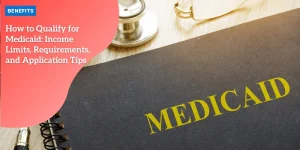U.S. Budget Cuts Under Fire: Experts Warn of Dire Consequences as Officials Downplay Fears

Mounting Controversy Over Trump Administration’s Budget Proposal
A renewed wave of criticism has emerged in June 2025 following statements made by Russ Vought, director of the U.S.
Anúncios
Office of Management and Budget (OMB), regarding the implications of a sweeping budget bill proposed under former President Donald Trump’s banner.
This legislation, titled the One Big Beautiful Bill Act, proposes significant reductions in two cornerstone federal support systems: Medicaid and the Supplemental Nutrition Assistance Program (SNAP).
While Republican leaders and Trump allies have praised the bill as a “return to fiscal sanity,” healthcare professionals, advocacy groups, and Democratic lawmakers argue that these cuts could have fatal consequences.
Anúncios
During a heated Sunday morning appearance on CNN’s State of the Union, Vought responded to rising public concern by dismissing such fears as “totally ridiculous,” calling them part of a broader campaign of “astroturfing” — or the illusion of grassroots outrage.
The Stakes: Medicaid and SNAP Face Deep Reductions
The bill’s proposed cuts primarily target Medicaid — the federal healthcare program for low-income and disabled Americans — and SNAP, which provides essential food assistance to millions of households.
If enacted, the legislation would significantly restructure how these programs are administered, limiting eligibility, imposing stricter work requirements, and reducing overall funding.
Anúncios
Critics argue that these structural changes are not simply technical adjustments. Rather, they constitute a fundamental shift in how the U.S. government supports its most vulnerable citizens.
Similar warnings have been issued by the American Academy of Pediatrics, which stated that the bill would “lead to hungry children and impossible choices for working families.”
The American Hospital Association has voiced concern that rural hospitals — already struggling with financial instability — may be forced to shut down if Medicaid reimbursements are slashed.
Public Backlash Intensifies Following Iowa Town Hall
The controversy gained national attention last week during a town hall hosted by Iowa Senator Joni Ernst.
When an attendee raised concerns that people would die if Medicaid were cut, Ernst responded, “We all are going to die,” a comment that was met with widespread criticism and online backlash.
In a follow-up video posted on social media, Ernst offered a sarcastic clarification rather than an apology, stating:
“I made an incorrect assumption that everyone in the auditorium understood that yes, we are all going to perish from this Earth.”
This tone-deaf response only served to fuel public outrage, with many accusing Republican lawmakers of being dismissive of the real human costs behind budgetary decisions.

Russ Vought and the Vision of Project 2025
Russ Vought’s staunch defense of the proposed legislation must be viewed within the broader context of Project 2025, a conservative policy roadmap designed to guide a potential second Trump presidency.
A key architect of this initiative, Vought has long advocated for smaller government and aggressive reductions in federal spending.
During his CNN appearance, Vought maintained that the bill would not dismantle the safety net but instead “preserve and protect” it by making it “more commonsense.”
He further accused opponents of exaggerating the impact, suggesting that many of the criticisms were orchestrated by political operatives rather than genuine grassroots movements.
However, this position has been met with skepticism by public policy experts who point out that Medicaid and SNAP serve as essential lifelines for millions of Americans — including children, the elderly, and individuals with disabilities.
| Event | Democrats’ Response | Republicans’ Stance |
|---|---|---|
| 📜 Bill Substance | Democratic lawmakers challenge the bill’s content and its potential impact | Republicans defend the bill, claiming it will address key issues |
| 🎙️ Dismissive Tone | Senator Chris Murphy condemns the dismissive attitude towards critics | Supporters of the bill argue the criticism is unwarranted and that the bill is needed |
| 📰 Media Coverage | Democrats express frustration with media portrayal of the bill’s supporters | Republicans maintain that the bill has been misrepresented by the media |
| 💬 Public Remarks | Senator Chris Murphy openly criticizes the remarks made by Vought on CNN | Vought and supporters dismiss the criticism as partisan rhetoric |
House and Senate Face Sharp Divides
Despite having passed the House of Representatives, the One Big Beautiful Bill Act faces a steeper climb in the Senate, where even some Republicans have expressed hesitation.
House Speaker Mike Johnson, who led the effort to pass the bill, has insisted that the legislation does not represent cuts but rather “efficiency reforms” aimed at reducing fraud, waste, and abuse.
However, critics argue that this narrative obscures the real impact of the changes.
By narrowing eligibility and imposing additional bureaucratic hurdles, the practical effect may indeed be a significant reduction in the number of Americans receiving benefits.
Hakeem Jeffries, House Minority Leader and a Democratic representative from New York, delivered a stark warning:
“Hospitals will close, nursing homes will shut down, and people will literally die if this bill becomes law.”
Astroturfing or Legitimate Protest?
Vought’s use of the term “astroturfing” has ignited a new layer of debate.
While it’s common for partisan actors to amplify messaging online, many advocacy organizations pushing back against the bill have longstanding community roots and deep experience in public health.
Grassroots groups like the National Disability Rights Network and Feeding America have issued urgent statements condemning the bill.
These organizations argue that the people most affected — low-income parents, elderly patients, and individuals with chronic conditions — are not political pawns but real Americans facing real consequences.
Economic Implications Beyond Healthcare
Beyond the moral and humanitarian concerns, economists have raised alarms about the broader impact of such deep cuts to federal assistance programs.
Reductions in SNAP spending, for instance, could have a ripple effect on local economies, particularly in rural areas where grocery stores rely heavily on customers using food benefits.
Medicaid, too, is a major source of funding for healthcare providers, especially in underserved communities.
If reimbursements fall or eligibility tightens, access to preventive care could be reduced, leading to higher long-term costs due to untreated illnesses and emergency room visits.
Conclusion: A Nation at a Crossroads
The debate surrounding the One Big Beautiful Bill Act has revealed a profound ideological divide in America — not just over fiscal policy but over the role of government in ensuring public well-being.
Supporters argue for reduced government intervention and greater personal responsibility.
Opponents counter that gutting foundational safety nets amounts to negligence in the face of preventable suffering.
As the Senate prepares to debate the legislation, the nation watches closely.
The outcome could reshape the American social contract for years to come.
Whether seen as a bold step toward reform or a dangerous rollback of hard-won protections, this budget battle is far from over.
What is clear, however, is that the stakes are high — and for millions of Americans, deeply personal.





